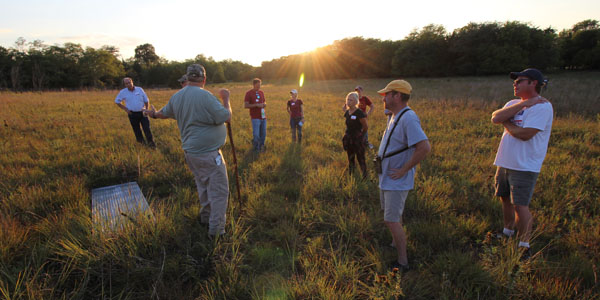
Becoming a Master Conservationist
Taking Iowa State University resources and personalizing them for a specific area of the state can be a challenge.
Researchers in Ames have knowledge and experience dealing with big-picture issues, while local conservationists are plugged into opportunities and challenges in their home area. The Master Conservationist Program at Iowa State aims to bridge that gap. Participants from all over the state learn from Iowa State faculty and extension specialists through an online, standardized curriculum using state and national materials. Local conservation professionals lead paired in-person sessions building on that information about wildlife, natural resources and conservation and tailoring the material to where participants live.
“Local connections are fundamental to the experience in the Master Conservationist Program,” says Adam Janke, assistant professor and extension wildlife specialist at Iowa State. “It allows a clearer image of how conservation challenges can be addressed at the local level.”
The program has been offered in various forms for more than 20 years. Its recently redesigned format allows participants to watch a video on their own from Iowa State experts on topics including prairies, forests, aquatic environments and watershed conservation. Participants then come together under the leadership of local conservationists to discuss the material and spend time in the field, seeing examples of those topics in their own backyard.
“Personalizing sessions allows us to discuss what’s most important to those taking the class,” says Hannah Howard (’13 forestry and animal ecology), community coordinator for The Nature Conservancy. Howard is the leader of a Master Conservationist class held in Muscatine and Louisa Counties in partnership with local Iowa State University Extension and Outreach county offices. “It’s one thing to hear statistics or generalities, but being able to handle and experience those types of things provides an experience not available in a classroom or with just online materials.”
Local leadership also provides a practical benefit of connecting users with nearby resources.
“A lot of people take this class because they just moved to an acreage or inherited the family farm and are looking to improve their land,” Howard says. “This class connects them with the resources they need.”
Approximately 60 Iowans have taken the course in two counties in its reformatted pilot phase, with many counties expressing interest in hosting the program in 2019.
“Natural resources underlie everything we do in Iowa,” Janke says. “Everyone needs clean, healthy water, a huge proportion of our economy depends on healthy soils and our quality of life is enriched by the beauty of our natural areas. The way to address the natural resource challenges we face is to inform an army of people who can go out on their land and improve conditions.”



